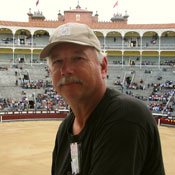Wednesday, December 9, 2015
"Was moechten Sie?" the server asked. I stared at him rather stupidly; I knew that he was asking what kind of turkey I wanted, but he said it in German, and I was expecting English or French.
Thanksgiving 2015 had been two days before. For me, living in France, where the holiday is just another work day and seeing the Facebook posts of family and friends enjoying the celebration, it gave me just a touch of homesickness.
But it was Saturday then: turkey day! We had crossed the now-heavily guarded Rhine River Bridge that crosses from Strasbourg, France, to Kehl, Germany. I noticed that at least the French and German police had gotten together and, instead of two roadblocks, one on each side, they only had one, on the French side, manned by French and German police. They were dressed all in black, and the only way to tell the difference between them was that the French had "POLICE" written on the back of their jackets whereas the Germans had "POLIZEI."
Walking past the roadblock elicited an interesting conversation with my 12-year-old daughter, as it was rather obvious that the officers were profiling. Every car they had pulled over had a Middle Eastern-looking man as the driver.
"That's racist," she said. I agreed, and tried to explain the rationale—that all of the Paris attackers had been males of Middle Eastern decent—but it sort of stuck in my mouth, and she wasn't buying it anyway.
We weren't going far into Germany, just over the bridge really, to Villa Schmidt, a restaurant on the banks of the Rhine River where we were gathering with other American ex-pats and a few Canadians to celebrate Thanksgiving together. The Canadians, although they fill an important niche here—i.e. speaking both French and English—seem to have an identity problem. They share a common language with the French but have more in common with Americans.
Villa Schmidt is a lovely place and has a terrific view of the Rhine River. Obviously, considering the 5-foot-solid concrete walls and the narrow casement windows, it had been a fortress guarding the banks of the river at one time, but it had been turned into a fine restaurant now.
Realizing that the server was speaking German and that I was holding up the line, I pointed to some dark meat and moved on to the green beans. The turkey was good. The sweet potatoes were good but did not taste like home. I am not sure what the gravy was; it looked like applesauce, but it wasn't. There were no mashed potatoes, just something like a white sauce with some corn in it, but it also was tasty. As I ate my turkey, I looked around the room, and the diversity amazed me. Next to me was an 18-year-old Finnish girl who is an au pair to someone in the American consulate. She is just completing her time as an au pair and will head to Australia to meet up with her boyfriend, whom she had met once, for one day, in Rome, but she assures me that they Skype and text every day.
At the next table over was Veronica, a 6-foot dark-haired woman who speaks English and French with a heavy Spanish accent (she grew up in Los Angeles) and her incredibly funny and smaller French husband. There was Renee, my favorite French Canadian, and absolutely the nicest person you can imagine. Our neighbors Ursula and Pierre were here. He is French, and she is German, but they met in California, and all of their children were born and raised in America.
In the far corner was a gaggle of beautiful, young women and babies sans men! They are the wives of American basketball players who are playing for local French teams and have been left alone because of an away game.
I was content. None of these people were family or lifelong friends (other than my wife and daughter), but we had gathered to share a common heritage in a foreign land. Some are here just for a short time, others are here for the duration, but all of us are thankful in these hard times.
R.H. Coupe is a visiting scientist at the University of Strasbourg in Strasbourg, France. He lives there with his wife of 31 years and their youngest daughter, studying the movement of water and agricultural chemicals off of a vineyard, as well as tasting its products.
